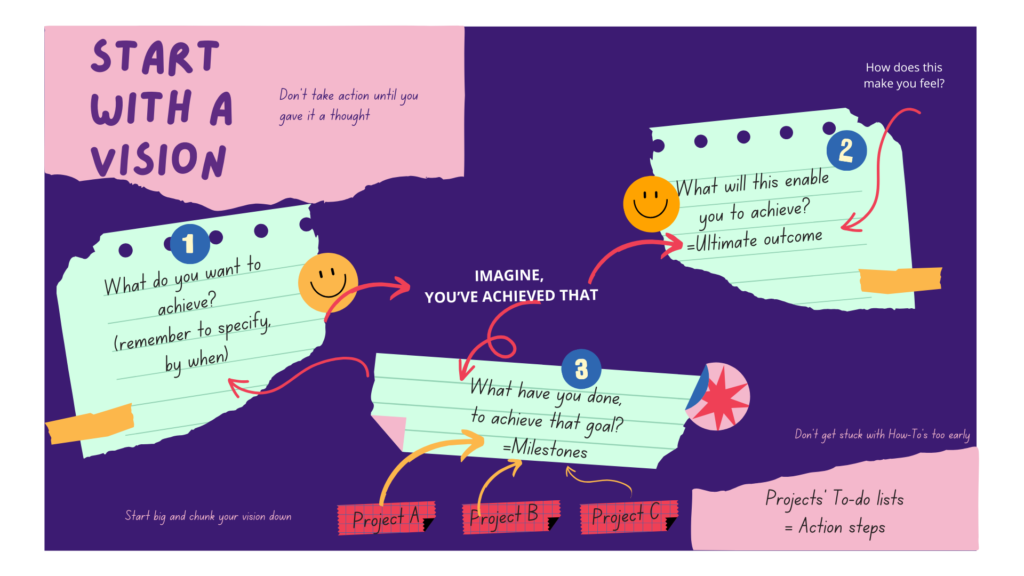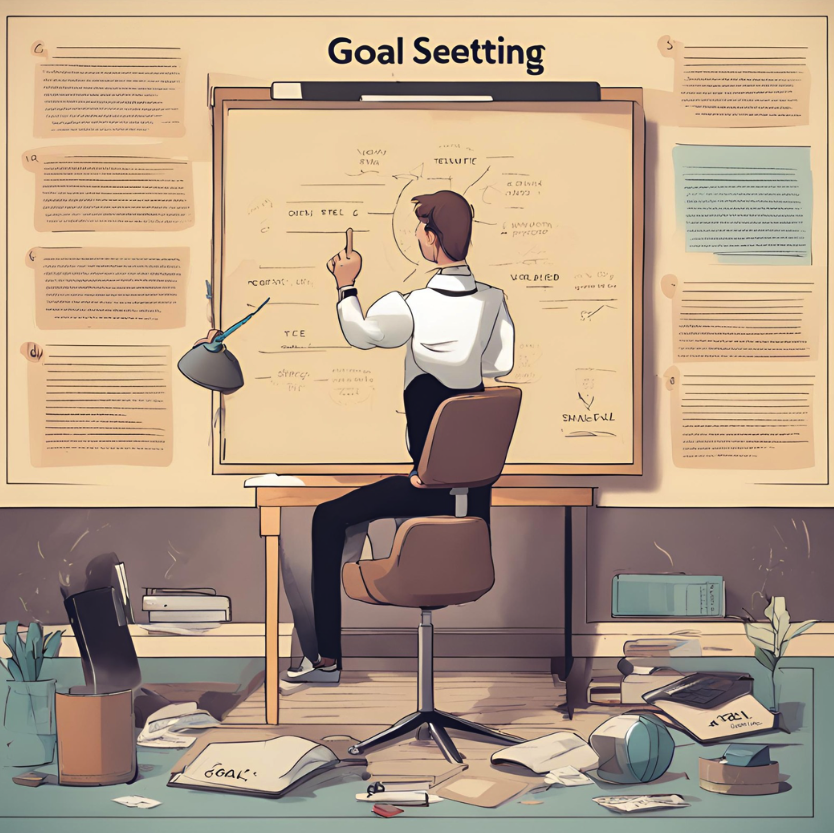Goal setting. Where to begin? Seemingly simple. Pull out a piece of paper, and write down what you want. Fix a date, so the Universe is clear when you’d like your wish to be delivered. Tuck away that record, and your dream will come true. Right?
If you want to create a souvenir of unaccomplished dreams. Otherwise, if you’re determined to achieve a desired outcome, you may want to start with a Vision.
Vision
Don’t rush into actions before you give it a thought. Actions are crucial to achieve any goal. But before you’re clear about the desired destination, it’s pointless to start running.
What do you want to achieve? = That’s your GOAL (for example, to publish a particular book for a certain audience by a set date)
Yet, that’s not enough. It’s like knowing which supermarket to go to. You need to know what you want to end up in your basket with. And as they say, don’t go shopping hungry before you draft your shopping list. Be clear about your intentions from the start. Otherwise, you might end up with the wrong bucket list.
Ask yourself, What achieving this goal will enable you to achieve? This is your ultimate reason to work hard and follow through when it gets tough. (An example here would be an ambition to become an influencer whereas a published book is a chosen tool to achieve that.)
And how would you know you achieved that? Utilise your vision. See what you’ll be doing, and who will be the people around you. (You might picture yourself signing a printed book copy for a client.)
Imagining things through your eyes, how does that make you feel achieving that goal? This will help you get emotionally involved. To reinforce this feeling see the prospect of achieving your desired future through your eyes. Associated state fires off our emotional responses.
And now, set the deadline to achieve your goal. Don’t worry about being accurate at this stage, you can always amend this date according to new knowledge and your progress.
Imagine for a moment you’ve achieved that vision.
Knowing what you know, at that stage, what helped you get there? Write down your thoughts.
That’ll give you clarity on Milestones.
These will define the Projects that brought you there, that’ll break into actionable steps, you’ll need to take.
While setting a goal, utilise a Big vision -> small steps approach. There’s always a temptation to start with defining a familiar territory, where we draft a to-do list based on our current, yet insufficient, knowledge, and, filled with excitement, jump, prematurely, into action. Yet, once unclear about some aspects of a project/goal, we get put off or start procrastinating. The good news is that you don’t need to know all the answers at the starting point.
However, you require a bigger vision and clarity on an ultimate outcome, i.e. what achieving your goal will help you to achieve. That’ll keep refilling you with the inspiration to progress as long as you’ve identified a vehicle to provide you with that outcome — or your goal — correctly. And being clear about your goal will help you to stay determined and pursue a concrete objective.
Starting small, you risk getting overwhelmed by details and eventually lose the desire to achieve your end goal. Constantly referring to a bigger picture yet focusing on a small task in front of you will keep you motivated, enable you to stay on track, cut off the anxiety of the unknown, and progress.
Let’s utilise that book-writing example. One approach might be to plunge into writing. Yet, you might get off track, some days inspiration might not show up, and then you lose time. Lacking clarity and running behind deadlines, completing a book, will eventually start feeling like an over-ambitious, never-ending disaster.
A contrary approach would be to start with an outline while you’re in a state and feel excited about the idea. That’s the vision that turns our excitement button on. Utilise it. Write down a summary of what you picture a final book like. Afterwards, you’ll be able to break that summary into chapters, those in paragraphs and then you can flesh out the plot.
And whenever you’re puzzled with some parts, or waiting for more info from someone, you can jump to another chapter and work on it instead of staring at the blank sheet gradually demobilising your spirit. Equally, with this approach, you can always refer to the plot summary reminding yourself of the overarching vision to provide a product your clients require. That will not only keep you on track but will also trigger and refill your excitement tank.
Start big, and figure out details later. Don’t get stuck with How-to’s too early.

Major Roadblocks
Amongst the key reasons some people fail to achieve their goals is the Lack of clarity:
‘Why’ do you want to achieve that goal? Essentially, the reason behind your desire. What achieving that goal will give you or enable you to achieve? When setting any goal, keep in mind the outcome of an outcome. Otherwise, you’ll suffer from a lack of determination, a foundation of poor discipline.
‘What specifically’ is that you want to achieve? Many people know they want to be happy. Or to buy their first home. Or to get married. Or to become millionaires. Or to start their own business. However, take a minute and experiment with your navigator. Ask it to take you ‘somewhere warm.’
Don’t be lazy, spend time, and do your research to become clear about what you want to achieve. Watching you making this effort and getting more excited, your brain will figure that you’re serious about your intentions this time and it’s better to help you achieve what you want. You’ll also get more committed and disciplined to take further actions after you’ve spent some time figuring out what specifically you want.
‘By when?’ That’s what distinguishes a goal from a dream. If you don’t set a clear date — you’ll lack commitment. Often people get fearful that, the moment they pick a date, this becomes real. They’ll have to work, and God no, might achieve their goal. It’s easier to be vague. Setting up a realistic deadline is work in itself: it takes research, thinking, and discipline. And that develops a completely different mindset to those seeking an escape in a Someday land.
‘How to?’ Knowing how to achieve your aspirations helps you to develop a system to get there.
The main difference between those who succeed and those who fail is the quality of the questions. While some people seek convincing excuses of WHY something doesn’t work, the winners devote themselves to finding HOW TO make things work.
And it’s OK Not to Know All the Answers From the Outset, there are Ways Around That:
- Close your eyes and imagine yourself in a boardroom with people who’ve accomplished similar goals. Ask them, how they’ve done that and which steps they’ve taken. Write their answers down.
- Ask Google or YouTube to introduce you to those who’ve achieved what you’re after. Watch them. Not only will you learn from their stories, but you’ll also become more convinced that what you’re aiming for is more than just a dream and is achievable.
- Find a mentor. A person who’s been there and done what you’re trying to accomplish. Leverage their expertise and industry contacts. If they don’t have the latter — find a better mentor.
- Get a coach. Coach doesn’t necessarily need to have industry knowledge or experience within your sector. A strong coach can work well content-free. Their job is to tap into your potential to utilise your skill, knowledge and creativity.
What to Avoid
- Being vague. Be crystal clear with your desired outcomes, not only of your goals but also of every single task. For example, spot the difference in the intention of checking your post versus sorting it out. Your intention will impact your outcome.
- Performing outside your weight class. Too small of a challenge will make you disinterested and bored, and put your brain asleep. An extremely ambitious goal, by contrast, if it doesn’t break your spine, can put you off during challenging times. Imagine you go to a gym and start lifting very heavy weights. In the best-case scenario, you’ll pause your workout for the next few days. You can’t afford this type of interruption. If you fail to follow through and take regular actions towards your goal, building momentum, life will get in the way. Then it’ll get trickier to get back on track, and eventually, you’ll lose your drive.
- Writing the goals down for the sake of writing them down. Written goals don’t work simply because we wrote them down being told to do that. They work when we write them down as reminders of something to act upon. This shows our brain that we’re serious. That’s when they transform from an idea into a plan.



